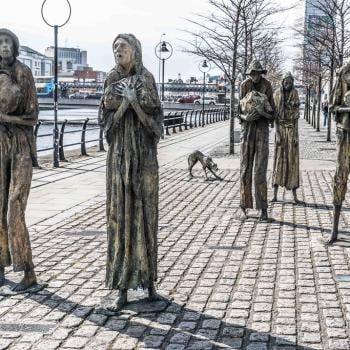Lectionary Reflections
Isaiah 35:1-10
December 15, 2013
With this famous passage, Isaiah concludes a series of chapters that focus on judgment against the enemies of Israel. Chapters 33-34 are angry demands that YHWH save the people with a power only YHWH can provide. "YHWH is enraged against the nations," claims Isaiah 34:2, "God has doomed them, has given them over for slaughter." Indeed the metaphors of death and assault and bloody destruction fill these chapters; they are clearly not easy reading and you are little likely to find them in any lectionary list. Quick! Let's get to Isaiah 35 before these images drown us in horror, before someone sells them to Hollywood for the next blockbuster epic!
What are we to do with these very unpleasant portraits of YHWH, seemingly bent on the doom of all who would threaten the chosen Israel? We preachers recoil at these monstrous notions of "stinking corpses" and bloody mountains," stained with the dead bodies of Israel's foes (Is. 34:3). Surely, desert blossoms and flowing rivers in the dry land trump smelly bodies and blood any day. Still, I admit that the stench of those bodies tends to waft over into the pleasant glories that are expressed in Isaiah 35. When Advent rolls around, it will hardly do to upset the Christmas-eyed folk with these bloated corpses and bloody hills, now, will it? Well, will it?
Perhaps again, context is all. There finally is no way to determine finally when Isaiah 33-35 was written, but we can easily surmise that it was during a time of extreme danger, of imminent disaster, of vast hopelessness. That, of course, could have been nearly any time during the long and checkered history of this tiny nation, but since the words are attributed to Isaiah, a school of prophets plying their trade during some two hundred years from the middle of the 8th century B.C.E. to the middle of the 6th, it seems likely that these words are uttered in the face either of the imminent destruction of Jerusalem (early 6th century) or perhaps in the face of the pathetic attempts of the returned exiles to survive in the blasted hulk of the ruined city (late 6th century). However that time is to be determined, or more accurately guessed, the puny people of God were staring disaster in its grim face, either in the person of real enemy armies or in the person of their destroyed homeland.
What to do? It is very hard, if not finally impossible, for us, comfortable and satisfied citizens of the U.S., to identify in any genuine way with these ancient Judeans. If our enemies threaten, we call in the Marines, the Army, the Air Force, fully expecting our armed forces to cow our enemies. If natural disaster strikes (pick any one of the recent ones), we fully expect our government to pick up the pieces of our shattered lives and get us going again. It may take time, and surely many persons in the path of Katrina and Sandy, those evil twins of mayhem, are still rebuilding and will be for some time. Still, we know they are getting and will get help.
Picture the many peasants of the Philippines, especially those who live some distance from the coast, whose lives have been quite literally destroyed by the most massive storm yet to arrive on land anywhere in the world, the typhoon Hai-Yan. What little these poor people had has been snatched away by 200-mile-per-hour winds and massive amounts of rain. Where shall they turn? Well, quite extraordinary rescue is on the way, from many of the world's nations, including money, food, support structures of myriad kinds. Even in the Philippines, where poverty is endemic, and hope is too often very small, help is coming, too slow, not enough, but coming nonetheless. Worldwide caring is again being manifest, and for that we can be grateful.
Where was 6th-century Judah to find help? Could they expect massive aid packages from the pharaohs of Egypt? Did the Babylonian Red Cross mobilize its units and sweep into the land, offering care packages of food and water? Hardly! Judah was alone, confronting the armies of their enemies and/or witnessing their once-prized city now a heap of ruins. They had only the hope of their mysterious YHWH to stand with them. It is very easy for us to decry their references to vengeance against those who destroyed their hopes and their dreams. It is quite simple for us to express our disgust at their morbid images of corpses and blood and to prize their far more delightful notions of rivers in a desert now lined with crocuses. Of course, even in the middle of Isaiah 35 there rests this rather mordant note: "Say to those who are fearful of heart, 'Be strong! Do not be afraid! Look, here is your God who comes with vengeance! With a divine recompense God comes to save you" (Is. 35:4)! In a world overcome with evil and death a weak and hopeless people call out for power and help against enemies too strong for them to handle on their own.





